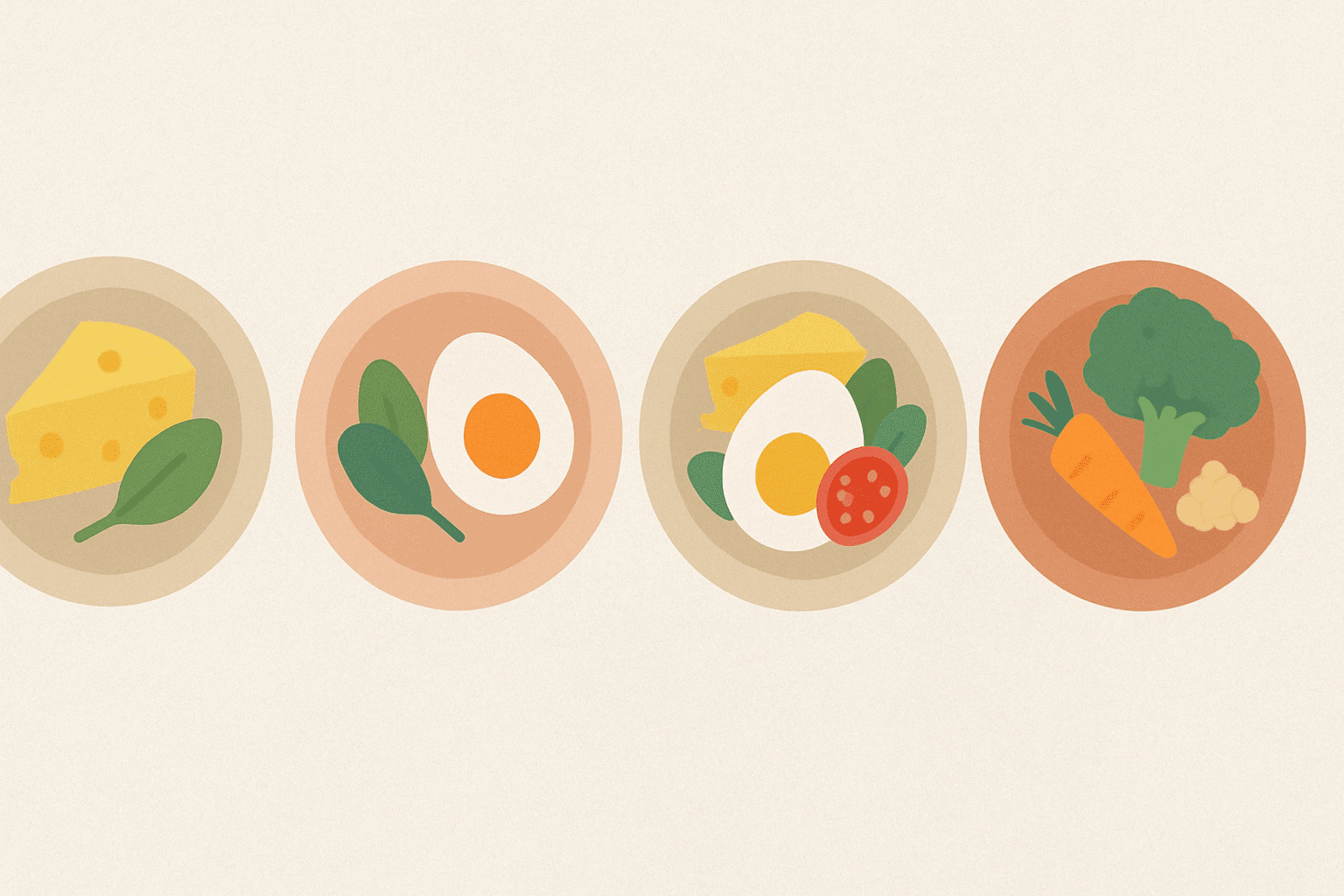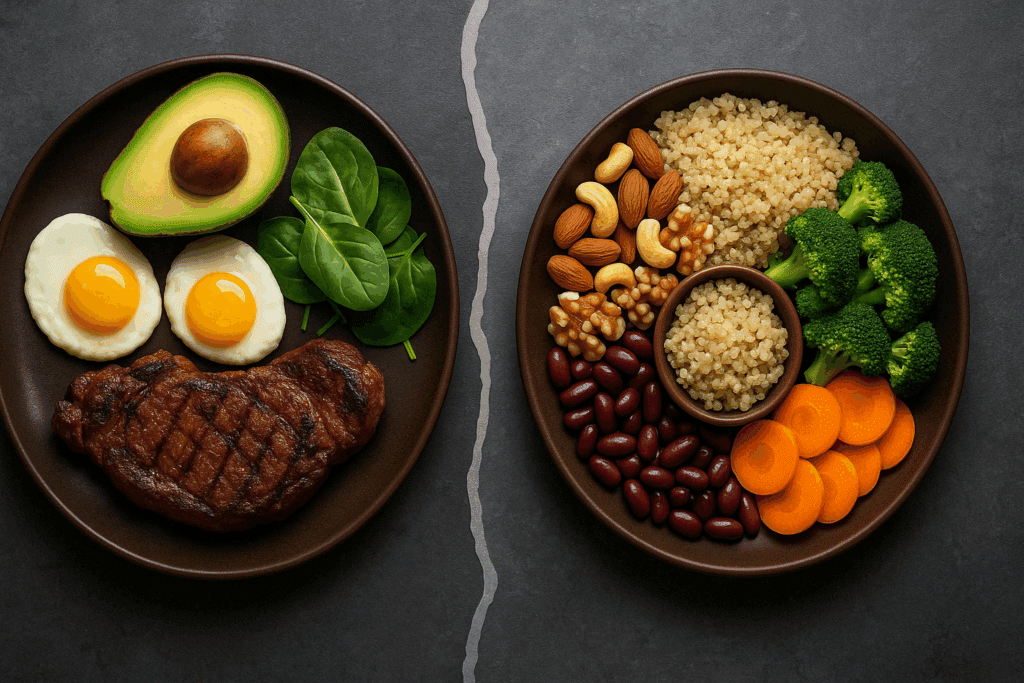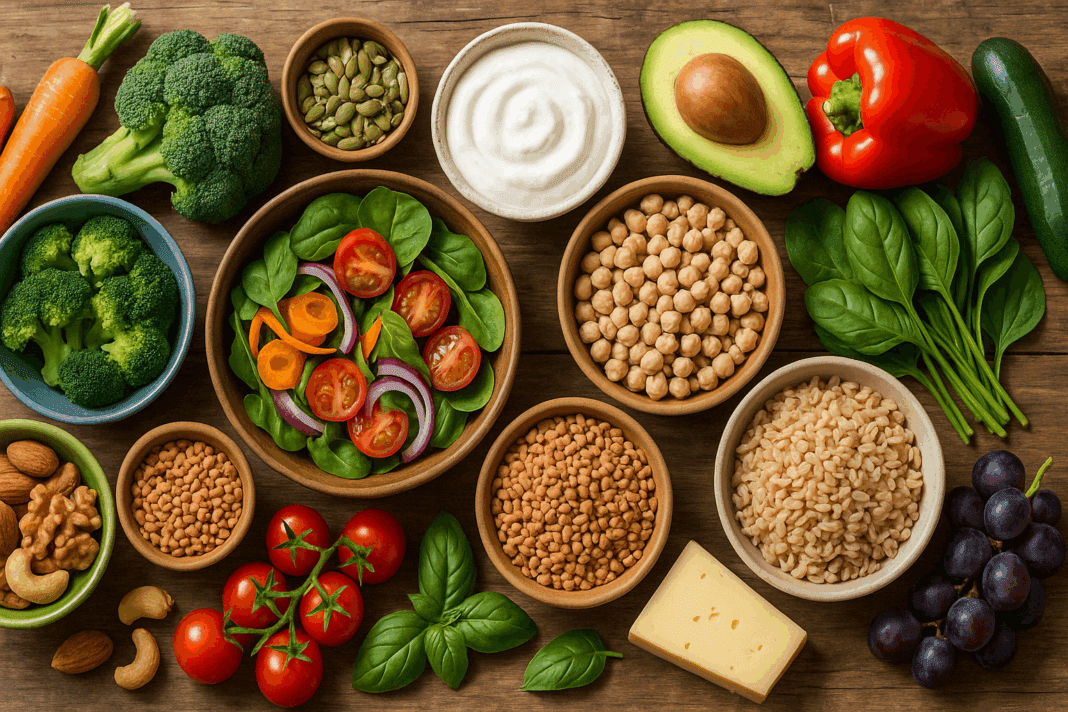In the evolving world of nutrition science, one of the most hotly debated questions remains: which is better for long-term health—a plant based diet or a meat based diet? As health-conscious individuals seek the most sustainable, evidence-based path toward wellness, this comparison has taken center stage. Understanding the long-term implications of our dietary choices is more important than ever, especially given the rising rates of chronic disease, environmental concerns, and the emerging popularity of various diet trends, including the ketogenic diet.
You may also like: Plant Based Diet vs Standard American Diet: What the Latest Studies Reveal About Long-Term Health Outcomes
From clinical trials to large population-based studies, plant-based diets continue to demonstrate robust health benefits. Yet proponents of meat-centric, low carb regimens argue for the nutritional density and evolutionary roots of omnivorous eating. So where does the evidence lead? To answer this question, we’ll explore what plant-based and meat-based diets truly entail, what long-term health outcomes the data supports, and how these dietary patterns stack up against modern trends like the ketogenic diet vs low carb diets in general. Along the way, we’ll address popular questions such as: Do vegetarians eat rice? Can vegetarians eat eggs and milk? And what does science say about vegan vs meat eater longevity?
Defining Plant-Based and Meat-Based Diets
Before diving into comparative health outcomes, it’s essential to define what we mean by a plant based diet vs meat based diet. A whole-food plant-based diet centers around unprocessed or minimally processed foods derived from plants. This includes fruits, vegetables, legumes, whole grains, nuts, seeds, and plant oils, often avoiding or minimizing animal products entirely. Vegan diets take this a step further, excluding all animal products including dairy, eggs, and honey.
In contrast, a meat-based diet typically emphasizes animal protein—such as beef, poultry, pork, and fish—often accompanied by eggs, dairy, and animal-derived fats. While not necessarily devoid of plants, the dietary focus tends to be on meats and high-protein foods. Advocates of carnivorous or ketogenic dietary approaches often highlight their low carbohydrate intake, which introduces comparisons like keto diet vs low carb diet—a distinction we’ll explore in detail.

Plant-Based Nutrition: What the Science Says
Evidence from a multitude of plant based studies suggests that those who consume more whole plant foods tend to have lower risks of chronic diseases. Research from the Adventist Health Studies and EPIC-Oxford cohort shows that vegetarians and vegans have significantly lower risks of ischemic heart disease, type 2 diabetes, and certain cancers compared to meat eaters. These studies also indicate that vegan diets may promote lower BMI, healthier blood pressure, and improved cholesterol profiles.
One reason behind these benefits lies in the nutrient density of plant-based diets. Rich in dietary fiber, antioxidants, phytochemicals, and healthy fats, whole plant foods support gut health, immune function, and inflammation reduction. On the other hand, diets high in red and processed meat have been linked to increased risks of cardiovascular disease and colorectal cancer, especially when meat is cooked at high temperatures or processed with nitrates.
Critically, the health benefits of plant-based diets appear most pronounced when the diet is centered on whole foods, rather than ultra-processed vegan products. Simply swapping meat for heavily processed vegan food may not confer the same benefits. For instance, vegan meat alternatives may contain high levels of sodium and saturated fats from coconut oil, undermining cardiovascular gains.
The Nutritional Case for Meat: Are There Advantages?
Despite growing support for plant-based eating, meat-based diets still offer certain nutritional advantages, especially when thoughtfully balanced. Animal products are rich sources of complete protein, vitamin B12, iron (in heme form), zinc, and long-chain omega-3 fatty acids (particularly from fatty fish). These nutrients play crucial roles in red blood cell production, brain function, and immune regulation.
For individuals at risk of nutritional deficiencies—such as the elderly, those with increased protein needs, or people with limited access to supplementation—meat can be an efficient, bioavailable source of essential nutrients. The debate between a vegan diet vs meat diet often hinges on this: can you get all necessary nutrients from plants alone? While it is possible, it requires careful planning. Vitamin B12, for example, is not naturally present in plant foods and must be obtained through fortified foods or supplements.
However, some argue that the benefits of meat are not without caveats. Higher intake of saturated fat, potential exposure to environmental contaminants, and the risk of overconsumption of protein are valid concerns. Still, moderate meat consumption, especially when it includes lean cuts and unprocessed options, can be compatible with good health—especially when accompanied by a variety of plant foods.

Cardiovascular Health: How Do the Diets Compare?
Perhaps no area of health has been more thoroughly examined in the vegetarian diet vs meat diet debate than cardiovascular disease. Numerous meta-analyses have found that vegetarians and vegans have lower rates of hypertension, total cholesterol, and ischemic heart disease. The Portfolio Diet and DASH Diet, both of which emphasize plant-based foods, have shown significant cardiovascular benefits, including lower LDL cholesterol and reduced blood pressure.
Meanwhile, meat-heavy, low-carb diets—especially those high in saturated fats—can raise cardiovascular risk, particularly when they rely on processed red meats. That said, the distinction between s keto low carb diets and Mediterranean-style low carb plans is crucial. Diets like the Mediterranean diet, which include small amounts of fish and lean meat along with abundant vegetables and healthy fats, show positive cardiovascular outcomes.
The issue becomes even more complex when comparing ketogenic diet vs low carb alternatives. A standard keto diet restricts carbohydrates to an extreme level, inducing ketosis. While some research supports its short-term benefits for weight loss and glycemic control, concerns remain about its long-term effects on lipid profiles and vascular health, especially when the diet is high in animal fats.
Longevity and Mortality: Do Vegans Live Longer?
When it comes to long-term survival, the question often becomes: Do vegans live longer than meat eaters? Population studies suggest they might. The Blue Zones—regions of the world with the highest concentrations of centenarians—follow largely plant-based eating patterns. In these regions, legumes, whole grains, and greens dominate the diet, while meat, if consumed, plays a minimal role.
A 2020 meta-analysis published in Critical Reviews in Food Science and Nutrition found that plant-based diets were associated with a 25% lower risk of all-cause mortality compared to omnivorous diets. However, it’s important to note that lifestyle factors—like exercise, smoking status, and socioeconomic status—also influence longevity. Still, the evidence supports the idea that minimizing animal product intake, especially processed meats, contributes to a longer, healthier life.

Vegan vs Meat Eater: Weight Management and Metabolism
Weight control is another area where the plant based vs meat based diet comparison becomes relevant. Studies consistently show that vegetarians and vegans tend to have lower body mass index (BMI) than meat eaters. Plant-based diets, being naturally lower in calorie density and higher in fiber, promote satiety and reduce total caloric intake without the need for strict portion control.
In contrast, meat-based diets—especially when combined with low-carb philosophies—may promote short-term weight loss through reduced insulin levels and greater satiety from protein and fat. The keto diet vs low carb diet discussion often hinges on this principle. Is keto a low carb diet? Yes, but to an extreme. While keto may lead to rapid fat loss initially, adherence over the long term proves challenging, and weight regain is common once carbohydrates are reintroduced.
Additionally, the low carb diet keto diet model may compromise metabolic flexibility. Some experts argue that a highly restrictive ketogenic plan can lead to downregulation of carbohydrate metabolism, making the body less adaptable over time. So, is a keto diet sustainable? For many, the answer appears to be no—particularly in the context of social eating, exercise performance, and long-term nutritional adequacy.

Gut Health and the Microbiome: Plants vs Protein
One of the most exciting frontiers in nutritional science lies in the study of the gut microbiome. Emerging research shows that diets high in fiber-rich plant foods foster microbial diversity and the proliferation of beneficial bacteria like Bifidobacteria and Lactobacillus. This is one area where vegan food vs meat shows stark contrasts. A fiber-depleted, meat-heavy diet tends to favor pro-inflammatory bacteria and reduce short-chain fatty acid production, which may negatively affect gut integrity and immune function.
Fiber is the cornerstone of gut health, and plant-based diets deliver it in abundance. Additionally, polyphenols found in colorful fruits and vegetables serve as prebiotics, further nourishing beneficial microbes. Meat, on the other hand, lacks dietary fiber and may introduce harmful compounds like trimethylamine N-oxide (TMAO), particularly from red meat, which has been linked to atherosclerosis and other metabolic disorders.
Can Vegetarians Eat Eggs and Milk? What About Butter and Rice?
A common misconception is that all plant-based eaters avoid animal products completely. In reality, many vegetarians include dairy and eggs in their diets. So, can vegetarians eat eggs and milk? Absolutely—those following a lacto-ovo vegetarian diet do. Do vegetarians eat rice? Yes, rice is a plant-based staple across many cultures. And what about butter? That depends. While vegans avoid it, vegetarians may consume it unless they are following stricter guidelines.
These nuances matter when comparing vegetarian versus meat eater diets. The inclusion of some animal products can help vegetarians meet nutritional needs more easily than vegans, especially for nutrients like B12, vitamin D, and calcium. However, as plant-based food technology evolves, fortified plant milks, nutritional yeast, and other innovations are helping close the nutritional gap.
Is Keto a Good Diet or a Passing Trend?
The popularity of the ketogenic diet continues to rise, but questions persist: Is keto a good diet? And more importantly, is keto a low carb diet or a no-carb diet? While keto is indeed very low in carbohydrates, it’s not entirely carb-free. Still, compared to moderate low-carb diets that allow for fruit, legumes, and whole grains, keto is extremely restrictive.
Keto’s effectiveness for short-term weight loss and epilepsy management is well-established, but when considering long-term health, the data is less favorable. Diets devoid of fiber and plant diversity may increase inflammation, reduce gut health, and elevate cholesterol. As such, is a keto diet sustainable for most people? Evidence suggests not—especially when compared to more flexible plant-based diets that promote both metabolic health and dietary satisfaction.

Frequently Asked Questions: Plant Based Diet vs Meat for Long-Term Health
1. Can a plant-based diet meet the nutritional needs of athletes and highly active individuals?
Absolutely, a well-designed plant-based diet can support even the most demanding physical activities. Contrary to outdated assumptions that athletes need meat for strength, many endurance and strength athletes now thrive on vegan or vegetarian diets. The key lies in diversifying plant-based protein sources such as legumes, tofu, tempeh, and whole grains, which together can meet the body’s amino acid requirements. Emerging plant based studies also show that plant-based athletes experience less oxidative stress and faster recovery due to the high intake of antioxidants. When comparing a vegetarian diet vs meat diet for athletic performance, success often depends more on dietary planning than the presence or absence of animal products.
2. How does a plant based diet vs meat based diet affect hormonal health, especially in women?
Hormonal balance is intricately linked to nutrition, and both plant-based and meat-based diets influence it in different ways. Diets rich in fiber and phytoestrogens—naturally occurring in soy and flaxseeds—can help regulate estrogen levels, which may benefit women with hormonal imbalances. However, a plant based diet vs meat diet may need to be carefully managed to ensure adequate intake of zinc, vitamin B12, and iron, which are essential for thyroid and reproductive hormone function. On the flip side, excessive meat intake, especially red and processed meat, may contribute to higher estrogen levels and inflammation. Finding balance, rather than favoring one extreme, is often more beneficial when considering vegetarian or meat approaches to hormonal health.
3. Is the concern that a vegetarian is unhealthy due to lack of certain nutrients valid?
This concern, while common, is often rooted in misinformation or poorly executed vegetarian diets. Yes, a vegetarian is unhealthy if they rely heavily on refined carbs and ultra-processed foods while neglecting key nutrients. However, a well-rounded vegetarian or vegan diet that includes whole grains, legumes, leafy greens, seeds, and fortified foods can meet all essential nutritional requirements. Supplementation for nutrients like vitamin B12 and omega-3s can easily bridge any gaps. Comparing a vegetarian vs meat diet fairly requires examining dietary quality, not just food categories.
4. What role does gut health play in the plant based vs meat debate?
Gut health is emerging as a central player in long-term wellness, and diet has a profound influence on the microbiome. Fiber-rich vegan food vs meat-based meals often results in greater microbial diversity and the production of short-chain fatty acids that support immune and metabolic function. Diets high in red meat, on the other hand, can increase levels of TMAO, a metabolite associated with cardiovascular disease. Interestingly, plant based studies suggest that within just two weeks of switching to a plant-based diet, noticeable changes in gut flora and reduced inflammation markers can occur. So, when comparing vegetarian diets vs meat eating diets, the plant-based approach often gives the microbiome a significant advantage.
5. Which is healthier—vegan or vegetarian—when considering long-term brain health?
The question of which is healthier, vegan or vegetarian, for brain health is nuanced. Vegetarians often consume dairy and eggs, which provide choline and B12—two nutrients associated with cognitive function and memory. Vegans, while benefiting from the anti-inflammatory and antioxidant-rich properties of plant foods, must be more vigilant about supplementing these nutrients. However, some plant based studies indicate that neuroprotective compounds like polyphenols found in berries and leafy greens may offer advantages regardless of whether the diet includes animal products. Ultimately, a plant-based approach rich in diverse whole foods supports brain health more effectively than a highly processed meat or vegan diet.
6. Do cultural eating patterns influence the success of a vegetarian vs meat eater lifestyle?
Absolutely. Cultural context plays a huge role in whether a vegetarian vs meat eater lifestyle is sustainable and healthful. In countries like India or Ethiopia, traditional diets are largely plant-based and nutritionally robust, incorporating fermented foods, pulses, and spices that enhance digestion and nutrient absorption. In contrast, adopting a plant-based diet in highly meat-centric cultures without proper planning may result in deficiencies or reliance on processed alternatives. Even among omnivores, dietary quality varies greatly based on cultural food traditions. Recognizing these cultural nuances is essential when comparing a vegan diet vs meat diet on a global scale.
7. How do environmental toxins in meat compare to pesticide residues in plant foods?
This is an important yet often overlooked aspect of the plant based vs meat based diet conversation. Meat, especially from animals higher on the food chain, can bioaccumulate environmental toxins like dioxins, heavy metals, and persistent organic pollutants. These compounds may contribute to long-term disease risks, including endocrine disruption and cancer. While pesticide residues in plant foods are also a concern, they are typically present in smaller quantities and can often be reduced through proper washing or choosing organic options. So when evaluating vegan vs meat eater exposures to environmental toxins, the cumulative burden tends to be higher in meat-heavy diets.
8. Can a plant-based diet support healthy aging more effectively than a meat-based one?
Evidence increasingly supports the idea that plant-based diets promote healthier aging. Nutrient-dense, antioxidant-rich plant foods combat oxidative stress, a major factor in aging and chronic disease progression. In comparing vegetarian vs meat eater populations, those favoring plant-based foods often show better markers of biological aging, such as lower inflammation and longer telomeres. Moreover, the lower saturated fat content and higher fiber intake in a plant based diet vs meat model contribute to healthier cholesterol levels and metabolic resilience. While meat can play a role in aging healthfully, it’s the overall dietary pattern that makes the biggest difference.
9. Are there social or psychological factors to consider when deciding between a vegetarian or meat diet?
Yes, social and psychological factors can significantly impact one’s experience with a vegetarian or meat diet. Individuals who follow a plant-based lifestyle may experience increased social pressure or isolation in communities where meat is the norm. However, many also report a sense of alignment with personal values, improved mood, and reduced anxiety linked to ethical eating and reduced inflammation. On the other hand, those who follow a meat-based diet may benefit from convenience and cultural acceptance but could face internal conflict if environmental or ethical concerns arise. Exploring these factors adds depth to the conversation beyond the basic comparison of vegetarian diet vs meat diet.
10. What does the future of nutrition science suggest about the plant based diet vs meat debate?
The future of nutrition is leaning increasingly toward plant-forward eating patterns. Innovations in cellular agriculture, fermentation-based protein, and AI-guided diet personalization are reshaping how we view the vegan diet vs meat diet spectrum. Researchers are conducting more sophisticated plant based studies using genomics and microbiome mapping to tailor diets to individual needs. Additionally, global dietary guidelines are beginning to reflect sustainability considerations, further favoring a shift toward vegetarian diets vs meat eating diets. While meat will likely remain part of many diets, its role may evolve to be more supplemental than central, especially in the context of planetary and human health.

Final Thoughts: Weighing the Evidence on Plant Based Diet vs Meat
When evaluating the long-term health implications of a plant based diet vs meat, the weight of scientific evidence leans in favor of whole-food, plant-based nutrition. Plant-based eaters generally exhibit better outcomes in cardiovascular health, weight management, metabolic function, and gut health, with promising associations in longevity. While meat can offer essential nutrients—particularly in populations with elevated needs—these benefits must be weighed against the risks of high saturated fat intake, chronic disease associations, and environmental impacts.
Importantly, the healthiest dietary patterns are those that prioritize whole foods, minimize ultra-processing, and maintain nutritional adequacy over time. Whether choosing a vegetarian, vegan, or flexitarian path, the inclusion of a diverse array of plant foods remains the most consistent predictor of long-term well-being. For those considering whether to follow a vegetarian or meat-based diet, or exploring low carb diet keto diet trends, the answer lies not just in what you eliminate, but in what you choose to include—nourishing your body, your microbiome, and your future health with purpose and science in mind.
Was this article helpful? Don’t let it stop with you. Share it right now with someone who needs to see it—whether it’s a friend, a colleague, or your whole network. And if staying ahead on this topic matters to you, subscribe to this publication for the most up-to-date information. You’ll get the latest insights delivered straight to you—no searching, no missing out.
Further Reading:
Plant-based diets and long-term health: findings from the EPIC-Oxford study
Can a meat eater be as healthy as a plant-based person?
Disclaimer
The information contained in this article is provided for general informational purposes only and is not intended to serve as medical, legal, or professional advice. While NewsHealthWatch strives to present accurate, up-to-date, and reliable content, no warranty or guarantee, expressed or implied, is made regarding the completeness, accuracy, or adequacy of the information provided. Readers are strongly advised to seek the guidance of a qualified healthcare provider or other relevant professionals before acting on any information contained in this article. NewsHealthWatch, its authors, editors, and contributors expressly disclaim any liability for any damages, losses, or consequences arising directly or indirectly from the use, interpretation, or reliance on any information presented herein. The views and opinions expressed in this article are those of the author(s) and do not necessarily reflect the official policies or positions of NewsHealthWatch.

